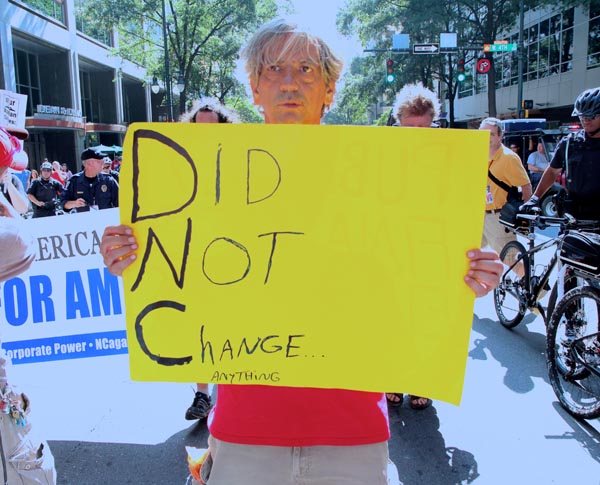
“Occupy the Democratic National Convention” was marked by frustration — an understandable feeling from the small and wearied band, protesting under conditions in which dissent was highly susceptible to ridicule.
There were less than a hundred Occupiers at the Marshall Park encampment, and sometimes night marches had as few as fifty activists. While Hurricane Isaac had prevented many from coming, a “miscommunication” about transportation had further thinned the numbers.
Activists who took buses from New York to the Republican National Convention in Tampa were under the impression that they would go to Charlotte afterwards. However, the transportation organizer, a polarizing Wall Street Occupier named Aaron Black, had apparently arranged for the buses to only go to the RNC (and had said on CNN that a lot of people in Occupy were not interested in protesting Obama). A group of about fifty Occupiers convinced the bus driver to drop them off in Charlotte, with no ride home.
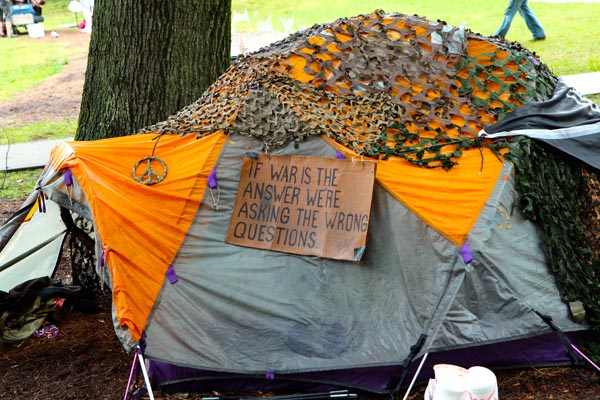
At Marshall Park, I helped set up a tarp for a clumsy half-hour using using wobbly plastic poles, in order to shield the donated food from a mid-day downpour.
A New York Occupier who was helping to organize the ad-hoc tent burst out, “Wasn’t anyone here at Zuccotti?” Another Occupier was upset that a march they had planned was cancelled, and cried, “This is bullshit, Occupy is dead,” and stormed off.
Further emphasizing how much the DNC encampment was not the romanticized Occupy Wall Street encampment, Marshall Park was quite far from the heart of the city, and was separated from it by barricades.
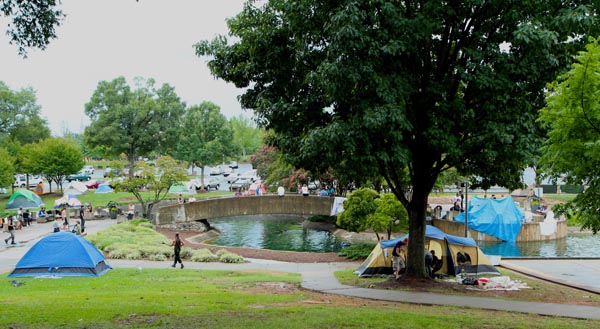
For me, circumventing the labyrinth of metal gates set up by police meant an inconvenient fifteen-minute walk from the Charlotte Convention Center. But some Occupiers claimed that the police prevented their escape from their metal parameters altogether — saying I only got through because I didn’t “look like a protester.”
Despite some gloomy circumstances, the protesters united around protests.
The demonstrations mostly varied on “money out of politics” themes, with some well-researched speeches and creative banners against targets like Duke Energy’s CEO, Jim Rogers, who allegedly funds the Democratic Party for political gain. Occupiers also held creative night marches, like a burning of the presidential oath to highlight Obama’s broken promises.
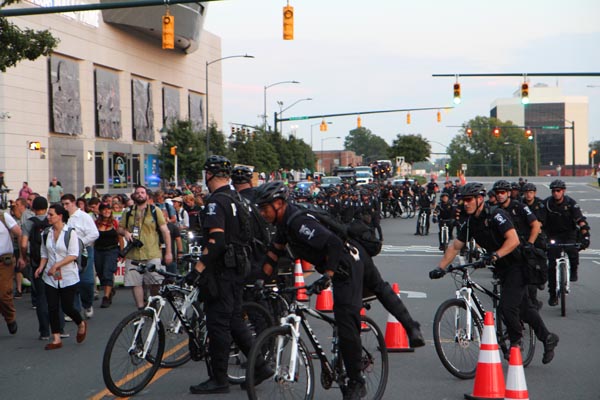
However, the city’s preparation, and the Right’s missionaries, made the whole thing feel a bit staged.
When two activists in Bank of America hazmat suits stopped to give a speech about Duke Energy, the police surrounded them, convention-goers and Charlotteans ogled at them, and one very angry right-winger shouted at them through a megaphone. “You know what your problem is? You smoke too much dope!”
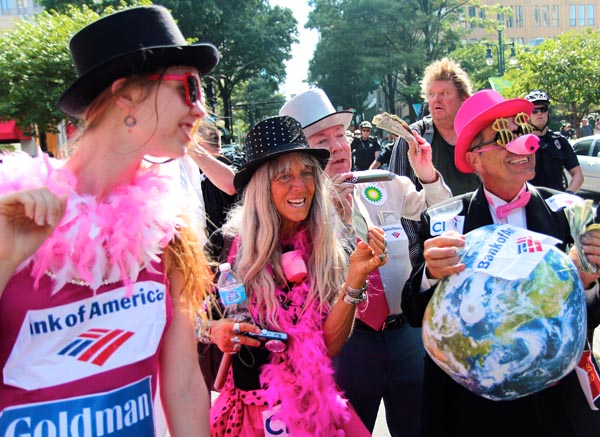
The police performance was astounding. Both Charlotte and Tampa had received $50 million from the federal government to secure the conventions. Charlotte’s finest certainly controlled the protests (searching bags and funneling activists with bicycles) and monitored the encampment (with at least one poorly disguised undercover officer). But the city seemed determine to spend the whole grant, and protected areas that were completely un-Occupied.
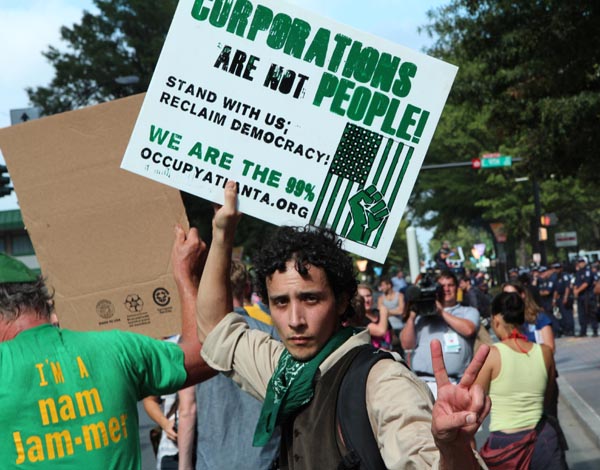
At a night march on Thursday of the convention, I walked four city blocks away from the protesters — actually around the corner and out of view of the 50-person demonstration — and still found cops lining the streets.
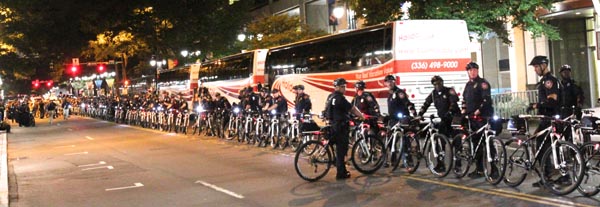
The gross number imbalance caused some Occupiers to respond poorly. When blocked from going down a particular street (although we were allowed in another direction), one young white male Occupier distracted the march for twenty minutes yelling at a baton-bearing cop, “Be a man! Put down your stick! C’mon, be a man!” Especially since Occupy tends to view masculine aggression as a form of domination and oppression, this showdown — which attracted some fifteen cameras — felt silly, if not appalling.
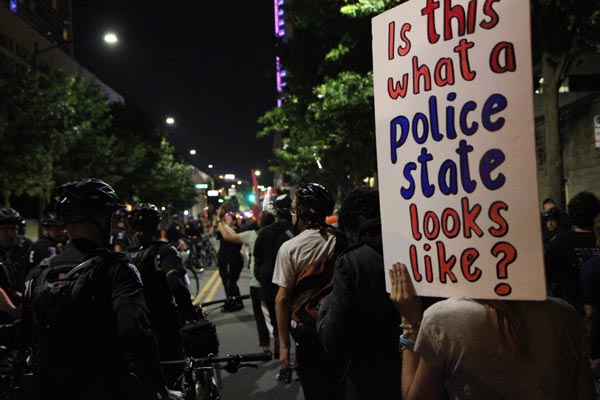
Later that night, the movement that so earnestly hopes to affect the masses, reverted to high school-style taunting when confronted with some Charlottean jocks. After a thoughtful speech about America’s foreign policy, a spectator called out “How about them Cowboys?” In response, Occupiers droned, “All I think about is sports,” and walked away as sidelined meatheads called after them “You guys are losers!”
As Occupy celebrates its one-year, this last episode was not too inspiring.
It’s one thing to be disappointed that the projected thousands didn’t turn out, like Occupier John Murdoch said, as it appeared in The New York Times, “Are we effective at this point? No, we’re outnumbered and easily mocked.”
But Occupy has dealt with ridicule, and it’s the internal disintegration in Charlotte was a bit troubling.
Asking if anyone had been at Zuccotti — isn’t that establishing a steep hierarchy in a horizontal movement? A young white guy challenging a cop on manliness, demanding all of the attention in the protest — doesn’t that fail on many levels of Occupy’s analysis of identity-based oppression and prefigurative politics?
Occupy has never had an easy environment, but at the DNC it eroded the activists’ camp to near crumbling. For Occupy to be effective in its second year, no matter what form it takes, it will need to show more internal fortitude than at the DNC. And if protest is going to be theater, then Occupiers need to figure out how they can direct the play.
***
Zachary Bell is a recent graduate from University of Pennsylvania with a Bachelor of Arts in Urban Studies. At Penn, he was a columnist for The Daily Pennsylvanian, and covered topics like Greek life, gender and sexuality issues, On Campus Recruiting, university governance, and historical determinism in his bi-weekly “Critical Playground” column. As a freelance journalist, he has contributed to The Nation “Extra Credit” blog, Campus Progress, Toward Freedom, and Occupied Stories. Zachary publishes photo essays, video documentary, and political analysis about Occupy and other social movements on his blog: http://zacharyabell.com/. Follow him on twitter @ZacharyABell. He is proudly from New Haven and currently lives in Philadelphia.
